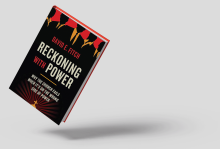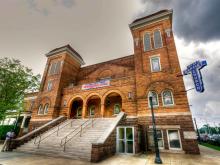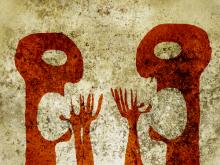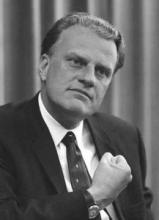congregations

THE POWER OF Jesus works like yeast: At first invisible, it transforms lives and eventually transforms cultures. In Reckoning with Power, David E. Fitch, a pastor and professor at Northern Seminary, explores this power — what he calls “Power With,” a relational and restorative type of power. It is, essentially, the power of love. Fitch contrasts this with worldly power, “Power Over,” which is hierarchical, domineering, and ultimately incompatible with Christianity.
Fitch first examines power sociologically, then biblically. He reads all scripture through the lens of Jesus’ authority to serve and heal. Helpfully, Fitch spends time discussing the difficult passages that seem to endorse God’s power as Power Over, including the Canaanite conquest and the violence in apocalyptic literature. He closes with some practical tactics for churches to help foster Power With, including a process of discernment he calls “IGTHSUS” (“It Has Seemed Good to the Holy Spirit and to Us”). Rather than model our communities after the power of the world, he encourages us to follow Christ by embracing God’s power.
Fitch’s core recommendation for how Power With should operate in churches is based on small groups discerning the Holy Spirit. However, he doesn’t acknowledge that small groups can also be sites of domination. Consider how misogynistic habits of conversation can privilege men’s voices. At times, Fitch is overly optimistic about our ability to relinquish Power Over.

In one of his last official acts, President Obama has designated Sixteenth Street Baptist Church, and other civil rights landmarks in Birmingham, Ala., as the Birmingham Civil Rights National Monument.
The designation protects the historic A.G. Gaston Motel in that city, where the Rev. Martin Luther King Jr. and other civil rights leaders had their 1963 campaign headquarters, as well as Kelly Ingram Park, where police turned hoses and dogs on civil rights protesters. And it includes the Sixteenth Street Baptist Church, where four girls died in 1963, after the Ku Klux Klan detonated 19 sticks of dynamite outside the church basement.

More people in the pews, more energy for programs, more funds to maintain the roof — these are all keys to survival for such small congregations, according to the latest Faith Communities Today report, released Jan. 4 by the Hartford Institute for Religion Research.
It finds that congregations with fewer than 100 in weekend attendance — the most vulnerable to collapse — rose to 58 percent in 2015, up from 49 percent five years ago.
Yet the report is optimistically titled: “American Congregations 2015: Thriving and Surviving.”

Despite threats from some conservative Christian dissenters, civil disobedience may turn out to be an irrelevant response to gay marriage.
To understand why, we have to think seriously about what civil disobedience really is.
Here’s a good definition: If a government mandates what religious people believe God forbids, or forbids what religious people believe God mandates, civil disobedience may be required.
In the first case civil disobedience involves the refusal to do what government commands, and in the second case it involves the continued practice of an act that government has banned.
Could this apply to the new legalization of gay marriage nationwide?

ONE OF MY favorite descriptions for the people of God, what the New Testament calls the “body of Christ,” is the evocative language of “the beloved community” used by Martin Luther King Jr. during the civil rights movement.
A beloved community is a powerful vision of a new coming together, a new community that welcomes all peoples in their diverse ethnicities and nationalities. Everygroup, clan, and tribe is included and invited in. That dream and vision undergirded King’s movement for civil and voting rights, both spiritually and philosophically, and deeply reflected his own underlying moral belief and hope as a Christian minister.
Yet in one of his most famous quotations, King also said this: “I am ashamed and appalled at the fact that 11 o’clock on Sunday morning is the most segregated hour in Christian America.” He said this in 1953, while he was still associate pastor at his father’s Ebenezer Baptist Church in Atlanta. But obviously, and most painfully, that quote is still true today.
MULTIRACIAL CHURCHES are becoming more common in this country—but that doesn’t happen by chance.
A 2010 study by the Hartford Institute for Religion Research, based on a random sample of more than 11,000 congregations, revealed an increase in multiracial congregations in the U.S.—30 percent of churches reported that more than half of their members were part of minority groups.
Members of three multiracial churches in and near the nation’s capital—one Catholic, one Methodist, and one nondenominational—say that at their church “people don’t look the same, or think that much about it,” and describe their congregations as welcoming places “where you can feel God’s presence, where you can be yourself.”
Though Sunday worship time is still known as “the most segregated hour in America,” older members of churches such as Peace Fellowship Church in Washington, D.C., St. Camillus Catholic Church in Silver Spring, Md., and Culmore United Methodist Church in Falls Church, Va., remember when things started changing. As migration and demographic shifts altered neighborhoods and communities, members sought to engage in “desegregated” worship, opting to join communities that mirrored a world with different cultures and ways to praise God.

To the Dying Church,
I hardly know what to say. Watching someone you love, who helped raise you, who cared for you when you weren't well, who partially defined who you would be, slowly perish before your eyes is difficult to say the least. I love you. I don't want to lose you.
But, this is life. These things happens. Those you love do die. It's just how it works. I mean, there were churches before you. They may not have looked like you or sung songs like you or taught exactly what you do, but they all had Love – just different ways of expressing it. They changed people's lives. They made some people better people and, sometimes, they made people worse people. Then, they died.
In all of it, Love was there somewhere hoping to be valued, hoping to be expressed, hoping to be shared.
Standing at the foot of your bed as you struggle to hold on, fight to catch a few last breaths, is uncomfortable and wonderful, all at the same time. Remembering the twinkle in your eye from my childhood, the liveliness of your step is as beautiful and heartbreaking a thing as I can think of in this moment.
Death sucks.

In an evangelical Christian climate obsessed with change, cultural trends, and trying to stay up-to-date and relevant, it's easy to undervalue the elderly. The bestselling authors, the hottest worship bands, the superstar conference speakers, and megachurch pastors are all youngish, or at least certainly not elderly, and they’re mainly marketed towards younger to middle-aged audiences.
In many ways, Christians have suffered from the sin of apathy, being guilty of ignoring a large segment of believers — the elderly — who are continually forced into the shadows of our ministries, leadership structures, publicity campaigns, vision, and dialogue.
In an era where fast-paced technology rules the world, elderly Christians are losing their platforms for communication — and the rest of us are too busy to reach out to them. Social media, blogs, websites, tablets, and smartphones continually shrink access to an elderly population that is unable to keep up — and we aren’t waiting for them.
THE CONGREGATIONAL HEALTH NETWORK began with a simple request from the largest hospital network in Memphis to a group of local pastors: Help us take better care of your people.
Ten years ago, officials at Methodist Le Bonheur Healthcare were worried that chronic diseases such as hypertension, diabetes, and obesity were threatening the well-being of local residents and sending health-care costs through the roof.
“People in their 20s were coming to the emergency room in end-stage renal failure,” said Rev. Bobby Baker, a Baptist pastor and director of faith and community partnerships at Methodist Healthcare. “That person is going to be using critical care resources for the rest of their life.”
Hospital officials knew something had to change. They wanted to focus on preventive health care—getting people in to see their doctor long before they were in a crisis. So in Memphis, a city where faith remains a powerful force and more than 60 percent of the population has ties to a religious group, they turned to churches for help. It started small, with a group of about a dozen pastors at churches near Methodist South hospital, in the city’s Whitehaven neighborhood. Those pastors recruited church members to serve as liaisons to the hospital, while the hospital assigned staff to work with churches. That small pilot, first called the Church Health Network, began in 2004.
Two years later, Methodist CEO and president Gary Shorb, along with Rev. Gary Gunderson, the former senior vice president for Methodist’s faith and health division, decided to expand the project system wide. That was the only way to make a significant impact on health outcomes, said Baker. “The thought was that it can’t be a pilot, it can’t be a research project—it really has to be broad reaching,” he said.

Conflict happens everywhere, from Congress to congregations, from boardrooms to bedrooms. The dysfunction of Congress is just a highly public instance of a typical conflict scenario.
I recently compiled some basics of church conflict. See if you agree with me that this playbook applies broadly.
Church conflicts – which will happen to all clergy and congregations eventually – generally focus on the clergy, just as conflict in any enterprise tends to focus on the top leader. That’s because the underlying issue usually is power – who calls the shots, who can initiate change, who can hold others accountable.
Secondary issues like specific actions, perceived performance and trust get the spotlight, but are surrogates for the power issue. People who want power don’t relish being perceived as wanting power. They prefer being seen as the aggrieved, better performers, more trustworthy, more faithful to ultimate purposes.
Church conflicts usually spring from a small group of antagonists, perhaps even a single person, who start with a conclusion, largely intuitive and emotional, and then search for reasons. Those reasons tend to be moving targets that defy better information. Deal with one reason, and two more take its place.
Antagonists, meanwhile, intimidate others into compliance, or at least silence, by making it clear they will stop at nothing to win.
I spoke with Chris Yaw recently, host of an online program called ChurchNext. On it, he has dialogues with a number of church leaders about the current state of organized religion, the changing face of Christianity and what our churches may do to remain (or become) relevant, vital ministries in the world.
Here’s a video of our chat. You can also download the whole episode from his website, or catch it as an audio-only MP3.
The National Association of Evangelicals is urging pastors to seek a common moral ground by uniting under a consistent code of ethics.
NAE leaders said the new code will provide uniform guidance to church leaders across the 40 denominations that comprise the nation’s largest evangelical group.
The new code is a good starting point for ministers in a profession that can be individualistic and entrepreneurial, said David P. Gushee, a professor of Christian ethics and director of the Center for Theology and Public Life at Mercer University.
“In some ways it’s the Wild West out there in terms of the context of preparation for ministry in the evangelical world,” he said. “Any effort to raise the moral bar and establish a minimal set of expectations for clergy — or any profession — is a very good thing.”

Billy Graham has always been a life-long learner, passionate about preaching the gospel but always ready to understand more about what that gospel means in the world. It was never surprising to me that this southern born and raised American evangelist decided early on to insist on preaching only to racially integrated coliseums and crusades, when many others just went along with their culture. Later, as a result of falling in love with the new congregations we was preaching too in Eastern Europe and the Soviet Union, had a "change of heart" on the nuclear arms race-which we featured in a cover interview with the evangelist in Sojourners magazine. Billy Graham has also been willing to admit his mistakes and grew from them, which is something all of us as "leaders" need to constantly learn from. And while a conservative evangelical all his life, Graham was never drawn to the hard edged and politicized fundamentalism of the "Religious Right" but instead often winced at them.
As the tenth anniversary of 9/11 approaches, many of us are wondering how best to honor the many victims of that tragedy and its aftermath.
Here in Cincinnati, my wife Marty's answer is inviting some of our friends to join us on a walk with some Muslim and Jewish families she invited by simply calling their congregations. She got the idea from my friends and me at Abraham's Path, who are sponsoring www.911walks.org to help people find or pull together their own 9/11 Walks all over the USA and around the world. The goal of these walks is simple: to help people honor all the victims of 9/11 by walking and talking kindly with neighbors and strangers, in celebration of our common humanity and in defiance of fear, misunderstanding, and hatred.
Rev. Steve Stone was just trying to be a good neighbor.
Two years ago, the pastor of Heartsong Church in Cordova, Tennessee, on the outskirts of Memphis, learned that a local mosque had bought property right across the street from the church. So he decided some Southern hospitality was in order.
A few days later, a sign appeared in front of the church. "Heartsong Church welcomes Memphis Islamic Center to the neighborhood," it read.
That small act of kindness was the start of an unlikely friendship between the two congregations, one that made headlines around the world. Members of the mosque and church have shared meals together, worked at a homeless shelter, and become friends over the past two years. When Stone learned that his Muslim friends needed a place to pray for Ramadan because their building wasn't ready, he opened up the doors of the church and let them hold Ramadan prayers there.
The way you think and feel about the world is shaped by what you see when you get out of bed in the morning. I remember hearing this from civil rights activists. It simply means that perspective is hugely determined by place, context, and vantage point. This is profoundly true for me and most of the people I've ever met. You see the world from the place you live.
Part of the problem in the current budget impasse in Washington, D.C. is the perspectives of the politicians in the debate. Every morning they see and hear each other; the gladiator ring of national politics; the Washington media; their donors; their ideological base; and their latest poll ratings.
As the federal debt ceiling standoff threatens to cause an economic catastrophe for our nation, more than 4,000 pastors across the country are opposing proposed immoral budget cuts that harm the most vulnerable people in their congregations and communities. An open letter to Congress and the president ran today as a full page ad in Politico. (You can view the ad and full list of signers here.) We were amazed by the huge response this letter generated. We hoped to find 1,000 pastors willing to speak out with us, and in just 2 weeks more than 4,000 clergy joined our campaign.